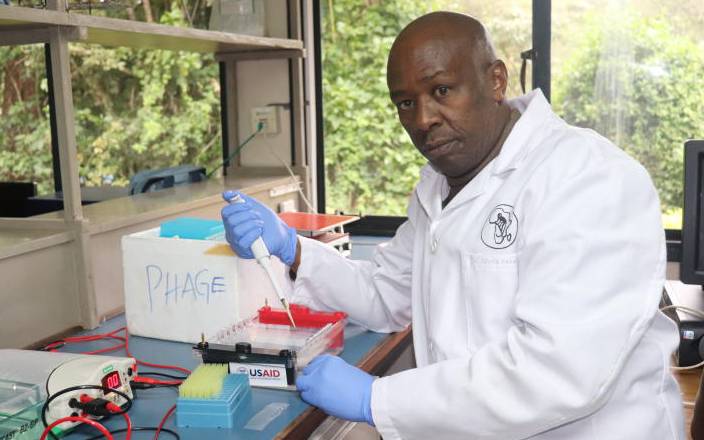
Tony Elumelu Entrepreneur and Scientist in HIV gel, Peter Mwethera gets top honour
In a year full of challenges and severe economic and social downturns, 2019 was not without its share of heroes.
“In the medical field, a Kenyan doctor, Peter Mwethera, has come up with a gel that once applied, will prevent HIV infection,” said President Uhuru Kenyatta in this year’s Jamhuri Day speech.
Last Friday, Dr Mwethera was honoured with the Head of State Commendation – Moran of the Order of the Burning Spear (MBS) – for his scientific breakthrough.
“It was a huge surprise but satisfying that our efforts are being recognised at the highest levels, it is very motivating,” Mwethera told The Standard.
Two days earlier on December 10, 2019, Mwethera’s work had been recognised at the African, Caribbean and Pacific (ACP) heads of State conference held in Nairobi.
In his keynote speech to leaders attending the conference, Nigerian billionaire, entrepreneur and philanthropist Tony Elumelu, cited Mwethera’s work as a success story in Africa.
In 2015, Mwethera was a recipient of the Tony Elumelu Entrepreneurship Award, which so far has financed 7,500 upcoming entrepreneurs from 54 African countries, with 497 from Kenya.
Mwethera, the head of reproductive health at the Institute of Primate Research (IPR), a State agency located inside Oloolua Forest in Karen, is being feted for developing what could be the world’s first anti-HIV microbicide, which also acts as a contraceptive and lubricant.
A microbicide is a substance applied inside the vagina or rectum to reduce the transmission of sexually-transmitted infections, including HIV.
“We started the work at IPR around 2005 and currently we have a product called UniPron ready for human clinical trials,” said Mwethera.
In July, Kavoo Linge, a consultant gyneacologist at Nairobi Hospital and the clinical adviser to the project, reported they are already seeking ethical and statutory approvals for the proposed trials.
While so far the project has cost about Sh200 million with half of the money coming from the government, the proposed clinical trials are estimated to require another Sh300 million.
But as plans for the trials mature, the team involving scientists, private sector investors, marketers, and local drug manufacture have put two lubricants in the market.
One, Smugel is a water-based lubricant used during sex, for lubricating surgical instruments in hospitals and in medical procedures such as in childbirth and prostate cancer examinations.
This has an estimated market value of 60 million units (each 50g) with the Kenya Medical Supplies Authority (Kemsa) procuring about 300,000 units annually.
“We hope to supply Kemsa with about 60,000 units next year,” said Mwethera.
The other product, marketed as Smuscan, is used in ultrasound scanning procedures with an estimated local market value of about Sh1.2 billion annually.
Currently, this market segment is served by imports. “We would want to change this and see our innovators become successful entrepreneurs, creating wealth and jobs locally,” says Salome Guchu, Kenya National Innovation Agency (Kenia) CEO.
In June, Kenia extended a Sh4.5 million seed grant to IPR for the commercialisation of Mwethera’s products.
“The awarded grant is for supporting product development and commercialisation,” said Dr Guchu in a letter to Mwethera.
Mwethera is also a winner of the 2019 Kenia/Newton Fund Award, under which the possibility of manufacturing UniPron in the UK for the US and European markets is being investigated.
“A lot still remains to be done but despite a hard 2019, I think the future is hopeful,” said the 52-year-old scientist.
Mwethera, who studied at Kenyatta University and the University of Bristol, UK, is married to Mary, a teacher, and they have four girls.
